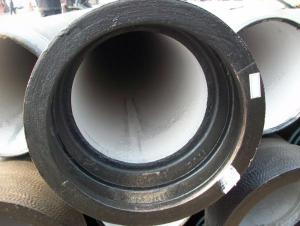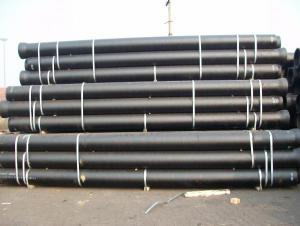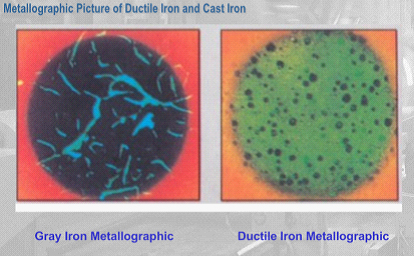Self-restrained Joint Ductile Iron Pipe
- Loading Port:
- China Main Port
- Payment Terms:
- TT or LC
- Min Order Qty:
- 1 Metric Ton m.t.
- Supply Capability:
- 300000 Metric Tons per Year m.t./month
OKorder Service Pledge
OKorder Financial Service
You Might Also Like
Overview of Ductile Iron Pipe
Ductile cast iron, also called ductile iron, spheroidal graphite iron, or nodular cast iron, is a type of cast iron invented in 1943. While most varieties of cast iron are brittle, ductile cast iron is much more flexible and elastic, due to its nodular graphite inclusions.
Graphite particles exist in the form of sphericity in ductile cast iron. Sizes graphite particle are restricted to 6 -7 class and spheroidizing rate should not be less than 80%. Thus after the spheroidizing process, ductile iron will be endowed with mechanical properties of both cast iron and steel.
Much of the production of ductile iron is in the form of ductile cast iron pipe, used for water supply and sewerage design. Ductile cast iron pipe is stronger and easier to tap, requires less support and provides greater flow area compared with pipes made from other materials like PVC, concrete, polyethylene or steel. Ductile Iron Pipe is the most widely-used pipeline product in water supply and water drain/sewage projects.
General introduction of Self-restrained Joint Ductile Iron Pipe
•Material : Ductile Cast Iron
•Size Range : DN 80mm to DN 1200mm
•Unit Effective Length : 6m or 5.7m or negotiable
•Manufacture Standard: ISO 2531:1998/ EN 545:2006/EN 598:2007
•Annual capacity : 300,000 tons
•Coating Exterior: Zinc 130g/m2 according to ISO 8179-1 and bitumen coating 70 microns.
•Cement Interior: Portland Cement/ High Alumina Cement/ Sulphate Resisting Cement Lining according to ISO 4179
•Special requirements on external coating and internal lining can be applied
•We also provide accessories such as SBR/EPDM rubber gaskets, lubricant paste, pipe caps, PE sleeves, etc.
Mechanical Properties
|
Item |
Tensile Strength (N/mm2) |
Elongation(%) |
Proof Stress (N/mm2) |
Hardness HB | ||
|
DN80 TO DN2600 |
DN80 TO DN1000 |
DN1100 TO DN2000 |
DN80 TO DN1000 |
DN100 TO DN2000 | ||
|
Pipe |
≥420 |
≥10 |
≥7 |
≥270 |
≥300 |
≤230 |
|
Fittings |
≥420 |
≥5 |
≥300 |
≤250 | ||
Standard Lining and Coating
External Protection
Metallic zinc complying with the standard ISO8179,and bitumen,or special protective coating according to the customer’s requirement.
Notes:
. Pipes and fittings conform to the requirements of International Standard ISO 2531,British Eurpean Standard BS
. EN545,and their extensions. If information given in English and Chinese differs,the English version prevails.
. Dimensions and masses of pipes and fittings are approximate and are for refererces only;accurate dimensions and
. masses should be confirmed with us at the time of placing order. Flanged joint pipes and fittings are generally
. available with PN10,PN16 and PN25. Socketed joint pipes and fittings generally available with T type and K type joints.
Features of Self-restrained Joint Ductile Iron Pipe:
. Ductile Iron Pipe offers proven reliability and the quality.
. It is quick and easy installation.
. The ductile iron pipe has high pressure capability.
Application:
Used for water and sewer lines.
Production Process
Much of the production of ductile iron is in the form of ductile cast iron pipe, used for water supply and sewerage design. Ductile iron pipe is stronger and easier to tap, requires less support and provides greater flow area compared with pipes made from other materials like PVC, concrete, polyethylene or steel.
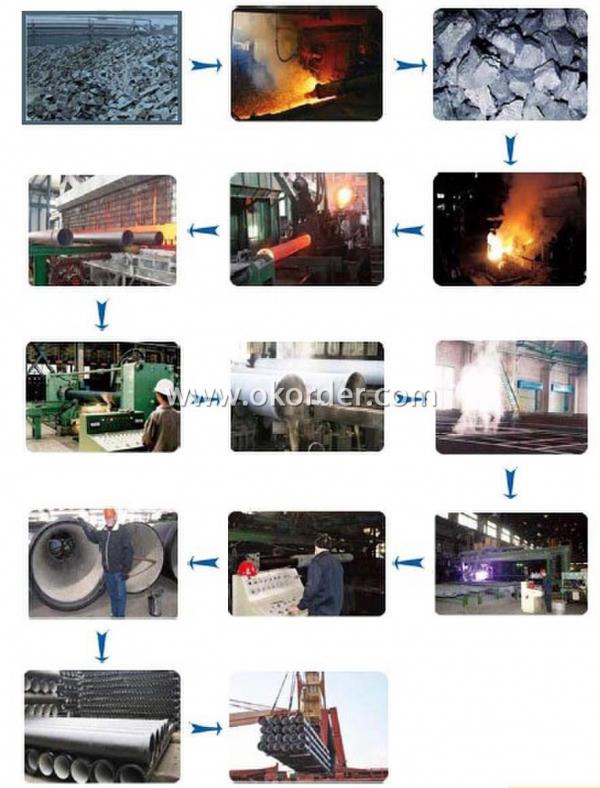
Specification of Self-restrained Joint Ductile Iron Pipe:
Standard wall thickness of Self-restrained Joint Ductile Iron Pipe
|
Nominal Diameter |
Wall Thickness(mm) | ||||||
|
DN(mm) |
Pipe |
Fittings | |||||
|
Class C |
K8 |
K9 |
K10 |
K12 |
K12 |
K14 | |
|
80 |
4.4 |
6 |
6.0 |
7 |
8.1 | ||
|
100 |
4.4 |
6.0 |
7.2 |
8.4 | |||
|
125 |
4.5 |
6.3 |
7.5 |
8.8 | |||
|
150 |
4.5 |
6.3 |
7.8 |
9.1 | |||
|
200 |
4.7 |
6.3 |
8.4 |
9.8 | |||
|
250 |
5.5 |
6.8 |
7.5 |
9 |
9 |
10.5 | |
|
300 |
6.2 |
6.4 |
7.2 |
8 |
9.6 |
9.6 |
11.2 |
|
350 |
6.3 |
6.8 |
7.7 |
8.5 |
10.2 |
10.2 |
11.9 |
|
400 |
6.5 |
7.2 |
8.1 |
9 |
10.8 |
10.8 |
12.6 |
|
450 |
6.9 |
7.6 |
8.6 |
9.5 |
11.4 |
11.4 |
13.3 |
|
500 |
7.5 |
8 |
9 |
10 |
12 |
12 |
14 |
|
600 |
8.7 |
8.8 |
9.9 |
11 |
13.2 |
13.2 |
15.4 |
|
700 |
8.6 |
9.6 |
10.8 |
12 |
14.4 |
14.4 |
16.8 |
|
800 |
9.6 |
10.4 |
11.7 |
13 |
15.6 |
15.6 |
18.2 |
|
900 |
11.6 |
11.2 |
12.6 |
14 |
16.8 |
16.8 |
19.6 |
|
1000 |
12.6 |
12 |
13.5 |
15 |
18 |
18 |
21 |
|
1200 |
13.6 |
13.6 |
15.3 |
17 |
20.4 |
20.4 |
22.8 |
|
1400 |
15.7 |
15.2 |
17.1 |
19 |
22.8 |
22.8 |
26.6 |
|
1500 |
16.7 |
16 |
18 |
20 |
24 |
24 |
31 |
|
1600 |
17.7 |
16.8 |
18.9 |
21 |
25.2 |
25.2 |
29.4 |
|
1800 |
19.7 |
18.4 |
20.7 |
23 |
27.6 |
27.6 |
32.2 |
|
2000 |
21.8 |
20 |
22.5 |
25 |
30 |
30 |
35 |
Self-restrained Joint
Self-restrained Type is a push-in self anchored joint. The principle of joint anchoring consists in transmitting the axial forces from one pipeline to the following one, thus ensuring that the joint does not come apart.
The application of self-restrained joints is of particular interest where congested conditions preclude concrete anchor block constructions or in poorly cohesive soils.Self-restrained joints combine the advantages of flexible joint pipes and welded joint pipes.
Photo of Self-restrained Joint Ductile Iron Pipe
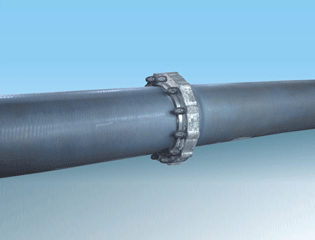
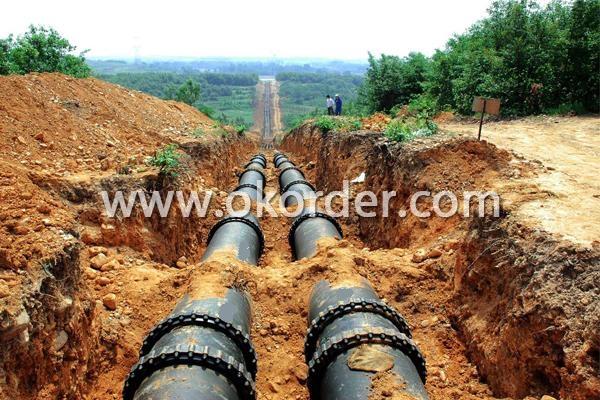
- Q:Can ductile iron pipes be used for high-pressure applications?
- Yes, ductile iron pipes can be used for high-pressure applications. Ductile iron has excellent strength and durability, making it suitable for handling high-pressure conditions. Additionally, ductile iron pipes have a higher pressure rating compared to other materials, making them a reliable choice for high-pressure applications.
- Q:The difference between cast iron pipe and ductile iron pipe
- I don't understand your question! Both have spigot and socket connection type pipe material, also have flange,
- Q:How are ductile iron pipes protected against external damage?
- Ductile iron pipes are protected against external damage through a variety of methods. One common method is the application of a protective coating to the pipe's exterior surface. This coating acts as a barrier, shielding the pipe from corrosive elements in the surrounding environment. Additionally, ductile iron pipes can be encased in concrete or a protective sleeve to provide further protection against external damage, such as impact or abrasion. Regular inspections and maintenance are also essential to identify any potential issues and ensure the ongoing protection of ductile iron pipes.
- Q:Are ductile iron pipes suitable for use in paper mills?
- Yes, ductile iron pipes are suitable for use in paper mills. Ductile iron pipes are known for their strength, durability, and corrosion resistance, making them ideal for handling various fluids, including those used in paper mills. Additionally, their ability to withstand high pressures and temperatures makes them reliable and long-lasting in the demanding operating conditions of a paper mill.
- Q:How long do ductile iron pipes last?
- Ductile iron pipes possess an impressive durability and extended lifespan. Typically, these pipes can endure from 80 to 100 years, with certain instances even reaching an impressive 150 years. The exceptional longevity of ductile iron pipes can be attributed to their sturdy construction, enabling them to withstand high-pressure surroundings, combat corrosion, and endure severe weather conditions. Furthermore, ductile iron pipes have established a commendable reputation for their reliability and performance, rendering them a favored option for water and wastewater infrastructure projects worldwide. By conducting regular inspections and implementing maintenance measures, the lifespan of ductile iron pipes can be further prolonged, assuring their continued service for numerous decades to come.
- Q:Are ductile iron pipes suitable for installation in areas with high soil compaction and traffic loads?
- Yes, ductile iron pipes are suitable for installation in areas with high soil compaction and traffic loads. Ductile iron pipes have high strength and durability, making them capable of withstanding heavy loads and compression from soil compaction. They offer excellent resistance to external forces and have a long lifespan, making them a reliable choice for such conditions.
- Q:Are ductile iron pipes suitable for use in geothermal applications?
- Yes, ductile iron pipes are suitable for use in geothermal applications. Geothermal systems involve harnessing the Earth's heat to generate energy or provide heating and cooling for buildings. Ductile iron pipes are known for their strength, durability, and corrosion resistance, all of which are vital qualities for geothermal applications. Geothermal systems often operate at high temperatures and pressures, and ductile iron pipes can withstand these conditions without compromising their structural integrity. They can handle the thermal expansion and contraction that occur in geothermal systems, ensuring a reliable and long-lasting piping solution. Furthermore, ductile iron pipes have excellent resistance to corrosion, making them well-suited for the potentially corrosive environment found in geothermal applications. This resistance ensures that the pipes will not degrade over time, maintaining the integrity of the system and minimizing the risk of leaks or failures. Additionally, ductile iron pipes have a smooth interior surface, which helps to minimize pressure loss and reduce energy consumption in geothermal systems. Their smoothness also reduces the likelihood of mineral deposits or scaling buildup, ensuring efficient and uninterrupted heat transfer. Overall, ductile iron pipes are a suitable choice for geothermal applications due to their strength, durability, corrosion resistance, thermal stability, and smooth interior surface. They provide a reliable and efficient piping solution that can withstand the demanding conditions of geothermal systems while ensuring long-term performance and minimal maintenance requirements.
- Q:What is the ductile cast iron pipe
- Cast iron pipe is called a coiled pipe, one is the mouth, and the other is the flange. It is often used in the joint of the cast iron pipe valve, and is often used in conjunction with the second pipe (plug pipe coil)
- Q:How are ductile iron pipes protected against freeze-thaw cycles?
- Ductile iron pipes are protected against freeze-thaw cycles by using a combination of insulation, proper installation techniques, and the addition of corrosion inhibitors or anti-freeze agents in the water supply. This helps prevent the expansion and contraction of the pipes caused by freezing and thawing, reducing the risk of damage or cracking.
- Q:How is ductile iron pipe manufactured?
- Ductile iron pipe is manufactured through a process called centrifugal casting. In this process, molten iron is poured into a spinning mold, causing the iron to be distributed evenly along the inner surface of the mold. As the mold cools, the iron solidifies and forms the pipe's shape. This method ensures a strong and durable pipe with excellent tensile strength and resistance to corrosion.
1. Manufacturer Overview |
|
|---|---|
| Location | Henan, China |
| Year Established | 1958 |
| Annual Output Value | Below US$1 Million |
| Main Markets | Mid East, Africa, South Asia, Eastern Asia |
| Company Certifications | ISO 9001:2008;ISO2531:2000 |
2. Manufacturer Certificates |
|
|---|---|
| a) Certification Name | |
| Range | |
| Reference | |
| Validity Period | |
3. Manufacturer Capability |
|
|---|---|
| a)Trade Capacity | |
| Nearest Port | Tianjin; Qingdao |
| Export Percentage | 1% - 10% |
| No.of Employees in Trade Department | 3000 People |
| Language Spoken: | English; Chinese; Spain; Alabic |
| b)Factory Information | |
| Factory Size: | Above 150,000 square meters |
| No. of Production Lines | Above 6 |
| Contract Manufacturing | OEM Service Offered; Design Service Offered |
| Product Price Range | Average |
Send your message to us
Self-restrained Joint Ductile Iron Pipe
- Loading Port:
- China Main Port
- Payment Terms:
- TT or LC
- Min Order Qty:
- 1 Metric Ton m.t.
- Supply Capability:
- 300000 Metric Tons per Year m.t./month
OKorder Service Pledge
OKorder Financial Service
Similar products
New products
Hot products
Related keywords

